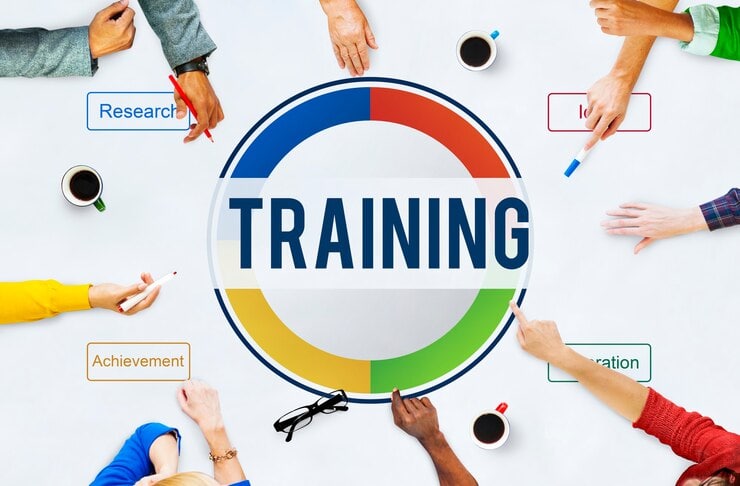Last updated on March 7, 2024 at 10:30 am
The terms “frontline operations” and “frontline workers” have become ingrained in our language since the onset of the pandemic, and rightfully so—they are indispensable to the smooth functioning of society. These dedicated individuals engage directly with customers or clients, playing pivotal roles in diverse sectors such as healthcare, retail, education, and more.
Given the paramount significance of frontline operations, it is only logical for frontline workers to undergo comprehensive training. This training equips them with the necessary skill set to adeptly navigate the challenges associated with optimizing operations. In this blog, we will thoroughly explore the realm of frontline employee training, shedding light on its pivotal role within an organization.
Streamlining Frontline Operations Through Employee Training
Streamlining involves pinpointing repetitive steps within a process that may not significantly contribute to the overall objectives. This practice empowers organizations to optimize efficiency.
To enhance operational efficiency, frontline workers undergo comprehensive training focused on effective streamlining. These training programs are intricately detailed, ensuring that employees emerge well-prepared to navigate a variety of situations. The meticulous nature of these courses underscores their importance, not only for the frontline workforce but also for the services and customers reliant on seamless frontline operations.
Skill Building
A pivotal aspect of frontline employee training and development lies in its emphasis on skill building. In today’s fiercely competitive professional landscape, frontline workers are expected to cultivate a diverse skill set to thrive. Communication, a fundamental skill, offers versatility to employees, but it merely scratches the surface. Technical knowledge, problem-solving, task prioritization, and teamwork are equally crucial for frontline operations.
Training programs are meticulously designed to empower frontline workers, enhancing existing skills and instilling new ones essential for future success. Considerable thought is invested in these programs to ensure frontline workers are equipped for every conceivable situation and factor.
So, what does frontline staff training entail? These programs encompass diverse elements, including technical workshops, soft-skill training sessions, and immersive role-playing scenarios. This comprehensive approach helps new frontline workers acclimate to various situations, covering a broad spectrum of subjects to keep them well-versed in essential aspects at all times.
As the frontline worker training market is projected to reach $62.93 billion by 2030, organizations must stay vigilant, consistently monitoring their training programs. This allows employees to address their weaknesses and continually enhance their strengths. In 2024, frontline worker training will enable employees to evolve, yielding improved results such as heightened customer satisfaction and reduced call handling times.
Process Optimization
Strategic planning is imperative for effective frontline operations. Organizations must meticulously optimize their operational processes, scrutinizing both frontline workers and the overall workflow. A detailed examination of every minute detail enables pinpointing areas for improvement, facilitated by clear procedures and standardized workflows.
The key lies in establishing a clear and concise procedure coupled with a standardized workflow. This ensures seamless operations for frontline staff, fostering stellar results and, most importantly, consistency.
To ensure continuous progress, training programs such as KPI-based coaching, mobile learning, and assessment-based training play a pivotal role. Incorporating educational tools like microlearning for frontline operators and features like multilingual content enhances inclusivity, making professional resources accessible to diverse frontline workers.
Many of these enhancements are integrated through streamlined procedures, simplifying otherwise complex processes. These procedures not only identify flaws hindering staff and company productivity but are specifically designed to elevate work quality and production. Beyond heightened productivity, this method significantly reduces error rates and expedites issue resolution—a proven approach for businesses to unleash their full potential and deliver gratifying results.
Technology Adoption
In the past several decades, technology has undergone a transformative evolution, emerging as an indispensable tool to meet the diverse needs of the global population. Beyond its essential nature, technology serves as a brilliant asset for training frontline employees. Augmented reality-based training significantly reduces the time required for frontline workers to attain proficiency. Complementary technological tools such as customer relationship management systems, automation, and gamification contribute to achieving positive training outcomes. As industries progress, there is a growing trend toward investing in technologies like content management systems to train frontline employees.
It is crucial for training programs to equip frontline employees with the skills to adapt to and leverage these evolving technologies. While technology provides an excellent avenue for enhancing learning, training programs must also prioritize accessibility to bridge the gap effectively. Consequently, careful consideration in structuring the entire training process for frontline employees is essential. These programs not only impart knowledge about the industry’s intricacies but also emphasize how to access available resources. Ultimately, this approach not only fosters resourcefulness in frontline workers but also significantly boosts employee productivity.
Development Beyond Training
Frontline operations play a pivotal role in various industries, including manufacturing, healthcare, hospitality, government, and logistics. The preparation process extends beyond initial training, encompassing a comprehensive set of tasks that frontline workers must proficiently complete to be considered ready for frontline operations.
In this dynamic industry, the journey of development persists post-training. Frontline employees undergo substantial mentoring and coaching to further refine their skills and capabilities. The commitment to ongoing guidance underscores the dedication to nurturing and enhancing the expertise of frontline trainees.
Mentoring and Coaching
In the realm of frontline operations, the combined efforts of mentoring and coaching play a pivotal role in elevating team performance and adaptability. Mentoring involves experienced individuals guiding their less-seasoned counterparts, and providing personalized support for professional and personal development. This one-on-one relationship fosters confidence, equipping frontline workers with the insights and skills needed to navigate challenges effectively.
Complementing mentoring, and coaching focuses on targeted skill enhancement, creating a collaborative partnership between coach and frontline employee. By offering constructive feedback, setting achievable goals, and adapting to individual needs, coaching cultivates a culture of continuous learning and improvement. Together, these approaches not only enhance efficiency but also contribute to a workforce that thrives in dynamic environments, aligns with organizational goals, and consistently delivers results, ensuring the steady improvement of frontline operations.
Performance Measurement and Feedback
The notion of undergoing a performance evaluation or receiving constructive feedback can be intimidating, particularly for frontline workers. Nevertheless, these processes are indispensable for ensuring the smooth functioning of frontline operations. Structured evaluation and feedback programs are specifically designed to facilitate the progress of each frontline employee. By meticulously tracking key factors, identifying strengths, and addressing weaknesses, organizations can optimize their operations and enhance employee productivity. The integration of mobile apps tailored for frontline employees has streamlined the evaluation and feedback process, making it more accessible and efficient.
Modern training programs have evolved to incorporate self-assessment and goal-setting skills for staff. These initiatives closely monitor individual progress, meticulously examining even the minutest details. This thorough approach enables organizations to optimize frontline performance comprehensively, addressing every aspect with precision.
To Sum Up
The pivotal role of training and development in streamlining frontline operations cannot be emphasized enough. It stands as a cornerstone for organizational success, equipping frontline employees with essential skills, knowledge, and confidence to effectively navigate the daily intricacies they encounter. Robust training programs not only elevate operational efficiency but also instill a culture of perpetual enhancement and adaptability. As frontline teams transform into proficient and well-prepared professionals, the positive impact resonates throughout the entire organization, fostering a resilient workforce poised to meet the challenges of a dynamic business landscape.
Frequently Asked Questions
1. How long does frontline employee training and development last?
The duration of frontline employee training and development can vary widely depending on the organization, industry, and specific job requirements. It may range from a few days to several weeks, encompassing initial onboarding and ongoing skill enhancement programs.
2. What measures are taken to ensure the relevance of training content in rapidly evolving industries?
To ensure the relevance of training content in rapidly evolving industries, measures include regular content updates, collaboration with industry experts, real-world scenario integration, feedback loops from employees, and leveraging technology for continuous adaptation.
3. What feedback mechanisms are incorporated into frontline training programs?
Frontline training programs often incorporate feedback mechanisms such as assessments, quizzes, and practical evaluations. Regular check-ins, surveys, and performance reviews provide ongoing insights. Interactive sessions, simulations, and real-time feedback from trainers enhance the learning experience. Additionally, peer evaluations and mentorship programs offer constructive feedback and support, ensuring continuous improvement and effectiveness in frontline training.
Subscribe To The theEMPLOYEEapp Newsletter
Comments are closed.




